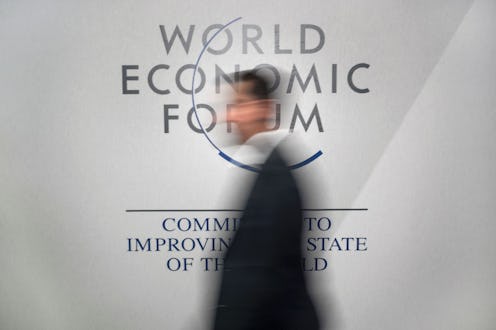News
The WEF's Persistent Gender Inequality
The World Economic Forum's annual winter meeting in Davos, Switzerland brings together the world's top business and political leaders to discuss foreign and economic policy, but a staggering majority are men. The 2016 conference began on Wednesday, and only 17.8 percent of the 2,500 attendees this year were women. Despite the fact that men hold most positions of power (although Beyoncé asserts that girls run the world), female forum participants and the United Nation's HeForShe campaign are tackling the World Economic Forum's gender inequality head on.
Elizabeth Nyamayaro, who runs the HeForShe campaign, will release a report on the issue, in which 10 companies will disclose the gender ratio of their employees. The global firms include big names like AccorHotels, Barclays, Twitter, McKinsey & Company, Schneider Electric, and Unilever. After receiving widespread criticism for its lack of diversity last year, Twitter promised to increase the amount of women in leadership roles from 22 percent to 25 percent — a fairly small margin. Nyamayaro's main goal is to create a way to track gender equality improvements, beginning with where companies stand now. "When we talk about progress, we have to know what it is we're measuring," she told The New York Times' Alexandra Stevenson.
In theme with HeForShe's mission, Nyamayaro is also trying to get men more men talking about gender equality and involved in establishing solutions in their respective industries. The United Nations campaign is working with each of the 10 companies to set new goals for female employees. So far, Unilever pledged to reach gender parity in management by 2020 and AccorHotels for all its employees in the same time frame. "I am personally passionate about the HeForShe initiative, which is in line with Unilever's ambition to empower 5 million women by 2020," Unilever CEO Paul Polman said on the HeForShe website. "I will use my voice to encourage sons, husbands, brothers and fathers to pledge their support and take action."
What's perhaps most promising is that gender equality will be a major topic of conversation in Davos this year, with panels (some made up of men) discussing what can be done to achieve gender parity. Progress has happened slowly, with 1 percent more women at the conference this year than last; however, the forum won't be half female until 2048 if it continues at this rate.
As it did last year, the World Economic Forum required its corporate partners to bring at least one woman for every four men in attendance, and if they couldn't find a woman, they were only allowed to bring four executives to the conference. This at least set a minimal standard for companies to include women in the delegations, but it was just that — minimal.
While it's encouraging that the forum is taking steps to include more women and the HeForShe campaign is working along side it to get more women in leadership roles, 2048 is too long to wait for real change.
Images: Bustle (1)
